The number of great white sharks in Cape Cod, especially the Outer Cape region, has been steadily rising.
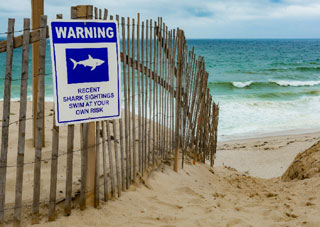 Sharks frequent Cape Cod waters because of the increasing number of grey seals (their prey) on the coast of New England due to the protection granted to them by law under the US Marine Mammal Protection Act. In addition to this, sharks have been protected at the federal level from being hunted since 1997, allowing their population to thrive.
Sharks frequent Cape Cod waters because of the increasing number of grey seals (their prey) on the coast of New England due to the protection granted to them by law under the US Marine Mammal Protection Act. In addition to this, sharks have been protected at the federal level from being hunted since 1997, allowing their population to thrive.
In this post, we’ll go over the population of sharks in Cape Cod, what time of year they’re most common, and what you can do to keep yourself safe in the water.
Are there a lot of Great White Sharks in Cape Cod?
Shark tagging has shown that sharks are particularly frequent in Nauset Beach (3800 detections) and North Truro (14,000 pings). According to Greg Skomal, sharks in Cape Cod are most common along the Outer Cape, including Cape Cod Bay North of Wellfleet and the Monomoy Islands (Chatham).
Since seals very heavily populate the Outer Cape, sharks are mostly seen frequenting those areas.
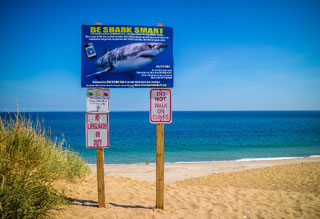 In addition, Cape Cod Bay, north of Wellfleet, has also had a surge in sharks, according to Greg Skomar, senior biologist with the Division of Marine Fisheries.
In addition, Cape Cod Bay, north of Wellfleet, has also had a surge in sharks, according to Greg Skomar, senior biologist with the Division of Marine Fisheries.
They’re also most common on the Monomoy Islands in Chatham, where seal numbers are up to tens of thousands.
Skomal and his team have been tagging sharks to track their activity since 2009 and have found 3800 detections from 64 sharks off Nauset Beach and 14,000 pings from 53 sharks somewhere along with North Truro.
Provincetown and Orleans have had 31 and 17 great white detections in 2019, respectively.
A total of 118 great whites were found off the MA coast, which is the biggest recorded number to date.
It’s essential to keep in mind that these increased numbers may be due to a large number of tagging that’s been happening recently. A total of 118 sharks were tagged in 2020, compared to only 7 in 2013.
What Should You Know about Sharks When Going to Cape Cod Beaches?
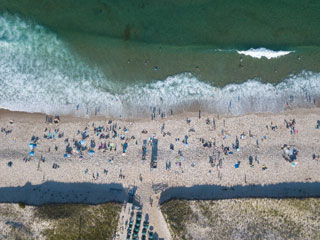 Sharks spend the most time in shallow waters, especially during the day when seals are closer to shore and when there’s a new moon since their night vision is stronger to spot seals. They stay away from shallow waters during the full moon because of weaker night vision and are most frequent in water temperatures of 48-69 degrees.
Sharks spend the most time in shallow waters, especially during the day when seals are closer to shore and when there’s a new moon since their night vision is stronger to spot seals. They stay away from shallow waters during the full moon because of weaker night vision and are most frequent in water temperatures of 48-69 degrees.
Sharks do tend to come close to the shore, despite the threat of being a large fish. This is because the reward of their prey is a greater incentive for them.
If the surf is rough, sharks will avoid those waters since it will involve too much effort when looking for prey.
How can you tell if a shark is nearby?
If you spot birds diving into the water and fish jumping, there’s a large probability of a predator, like a shark, being nearby. In addition, seeing porpoises can also be a sign of shark activity since both animals hunt the same prey. You can easily spot a shark by its dorsal fin.
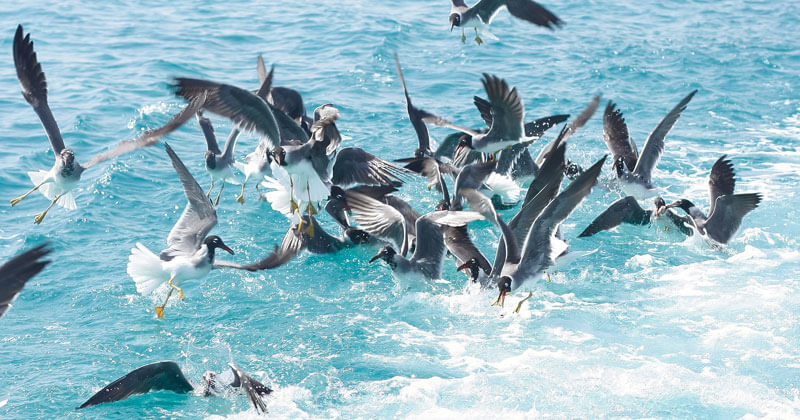
You should steer clear of murky waters. In cleaner water, sharks can tell you apart from their actual prey–which generally constitutes fish and seals.
Staying away from fishing zones–like piers–is an excellent thing to do. This is because the smell of bait and trapped fishes tend to attract great whites to this area.
Stereotypically, you can also spot a shark in the water by its dorsal fin.
If you do happen to catch sight of one, you are advised to report it on the Sharktivity app.
The app shows you live detections and movements of the great whites–but be careful, not all the sharks are tagged and will show up on the app!
Safety Tips and Safety Measures Implemented in the Cape
Some safety precautions to take when in the water include the following:
- Avoid areas that have seals and packs of fish
- Avoid fishing areas like piers
- Try to stay only waist-deep in the water (five feet or less)
- Try to avoid murky water since it makes it harder for sharks to differentiate their prey from you (and they know you’re not food).
- It’s best to swim, surf, or do water activities in groups
- You should avoid jewelry because it looks like fish scales.
- Avoid contrasting colors since sharks can decipher contrast.
- DO NOT enter the water if you’re bleeding.
Cape Cod keeps lifeguards on its beaches. On days they don’t, there’s a “swim at your own risk” signboard for beachgoers to follow.
Cape Cod beaches also implement a beach flag warning system, where red indicates you can’t enter the water and purple means sharks.
The Cape Cod National Seashore is a part of the Regional Shark Working Group that focuses on shark awareness, research, and safety measures.
They’ve come up with beach signage, brochures, purple shark flags, sharktivity app, and a shark smart video for beach-goers’ safety.
When Do Great White Sharks Return to Cape Cod?
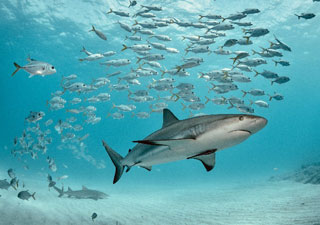 Great White Sharks start showing up in Cape Cod waters from June to mid-December, and their peak time is from August-October. They depart by December to the southeastern US and The Gulf of Mexico, looking for warmer waters.
Great White Sharks start showing up in Cape Cod waters from June to mid-December, and their peak time is from August-October. They depart by December to the southeastern US and The Gulf of Mexico, looking for warmer waters.
Great whites are most active during the months of August-October.
Sharks favor water temperatures between 55- and 73-degrees Fahrenheit. As soon as temperatures start to cool down, they migrate to warmer waters near Florida and North Carolina. So, their presence is determined mainly by how warm the waters are.
Why Is There an Increase in Great White Sharks in the Cape?
According to James Sulikowski, researcher of Northeastern sharks, there has been an increase in grey seals in the New England area due to their protection under the US Marine Mammal Protection Act.
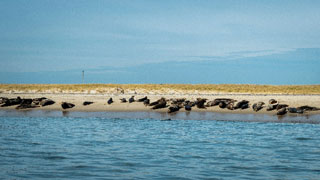 Since sharks feed on these seals, they’re found in New England areas like Cape Cod.
Since sharks feed on these seals, they’re found in New England areas like Cape Cod.
In addition, there have been legal restrictions on the hunting of white sharks, which has caused shark populations to rise in the area.
Why Do Sharks Like Cape Cod?
Since sharks feed on grey seals and these seals find suitable habitats in Cape Cod waters, sharks tend to inhabit these areas. There are higher seal numbers in 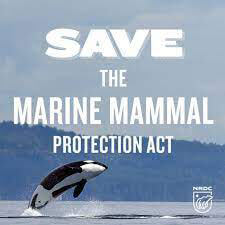 the 10,000s on the Outer Cape and places like Chatham. Sharks come to these waters to feed in their shallow depths.
the 10,000s on the Outer Cape and places like Chatham. Sharks come to these waters to feed in their shallow depths.
Initially, seals were commonly hunted, and their numbers were declining. However, due to the protection given by the , they tend to migrate towards MA waters.
James Sulikowski, a researcher of Northeastern sharks, says grey seals are most commonly found in shallow waters of the Outer Cape and the Cape Cod Bay north of Wellfleet.Chatham has a hefty population of seals, ranging in the tens of thousands, especially in the Monomoy Islands.
These seal populations draw sharks into the shallow waters of Cape Cod.
Moreover, the previously dwindling population of great white sharks in Cape Cod has been rising since 1997 due to federal protection. Naturally, these sharks are inclined to seek out the warm waters of the Cape for feeding.
Conclusion
Now that we know sharks prefer staying in waters 100 feet deep or less and frequently inhabit the Outer Cape areas, we can take necessary precautions when visiting those places. Ideally, non-peak times like April or May are an excellent time to enjoy swimming in the waters of Cape Cod.
If you decide to venture in these waters, it’s best to stay waist-deep only and keep note of the beach signage and flags. For more information, read “Is It Safe to Swim on Cape Cod?”

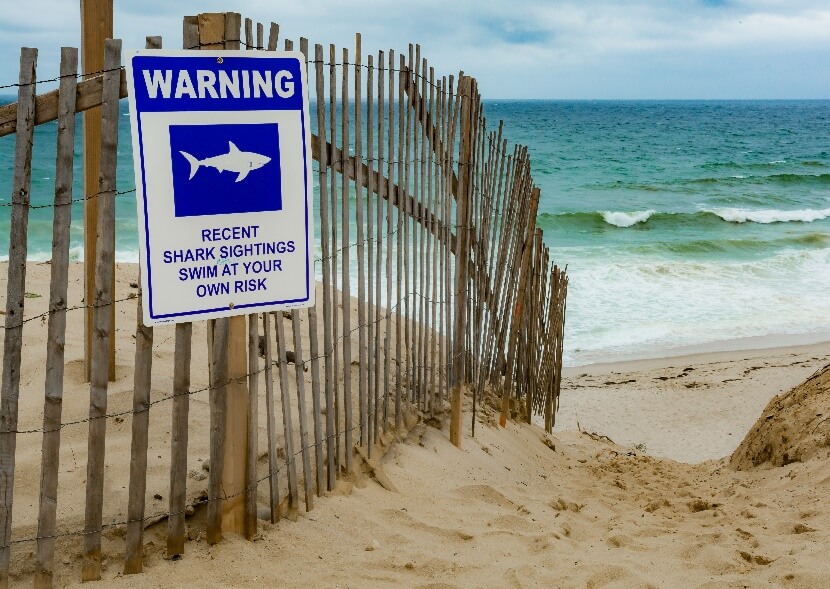








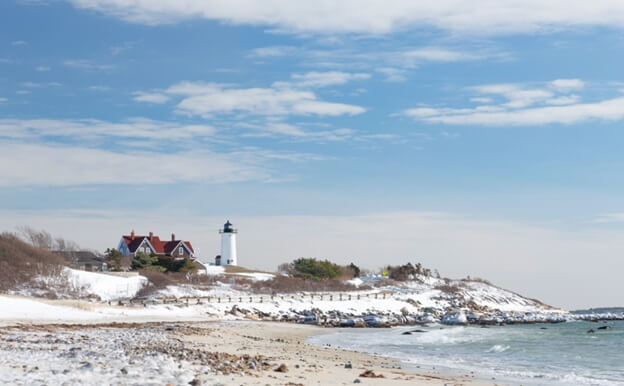

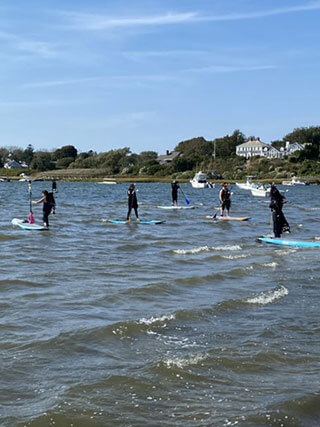
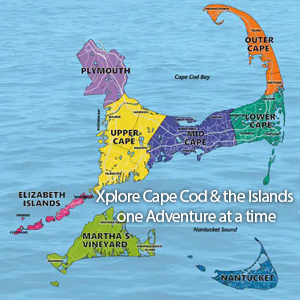
This Post Has 4 Comments
Has anyone experimented with using the sounds of killer whales (orcas) to scare away sharks? Sharks are deathly afraid of orcas, I’ve heard.
Also, in Hong Kong, steel nets are used in coves and bays to protect swimmers from sharks. Could this not be done on Cape Cod, designating certain areas as protected, while other areas with no nets are at your own risk?
SINCE THE SHARKS ARE A CLEAR AND IMINENT DANGER ITS TIME TO GET RID OF THE SEALS. PROTECTING SEALS WHILE PUTTING THOUSANDS OF CAPE COD TOURISTS IN IMINENT DANGER FROM HUNDREDS OF GIANT MANEATER SHARKS IS PURE INSANITY.
What’s insanity is human beings thinking they have some inherent right to swim in the ocean and that somehow that perceived right supersedes sharks’ actual rights to reproduce, hunt, and live peacefully.
Humans are the intruders, not the sharks. As for tourists, if they (and residents) obey the laws and educate themselves on how to live with these sharks, there should be no problem.
It’s exceedingly ignorant, and incredibly unfortunate, to hold the belief that sharks hold no ecological value and should be irradicated because it inconveniences humans’ ability to play in the ocean.
Well said!